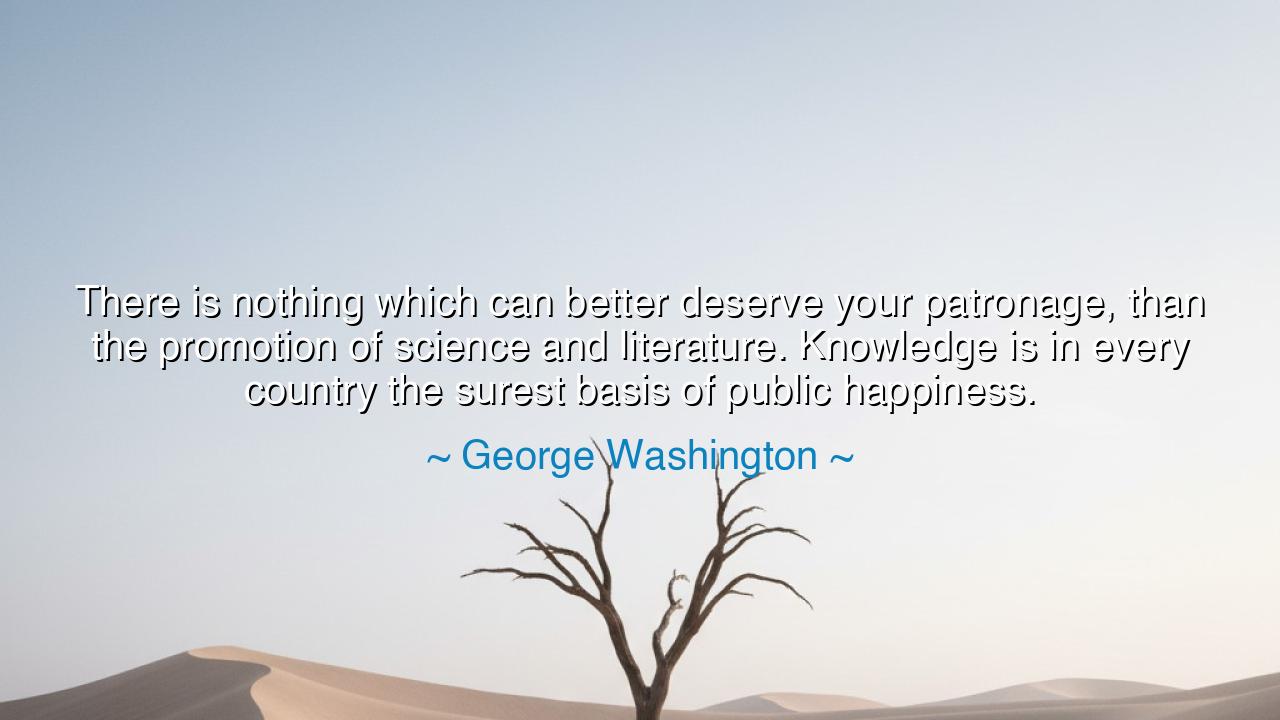
There is nothing which can better deserve your patronage, than
There is nothing which can better deserve your patronage, than the promotion of science and literature. Knowledge is in every country the surest basis of public happiness.






The great founder and father of a new nation, George Washington, once spoke words of eternal truth when he declared: “There is nothing which can better deserve your patronage, than the promotion of science and literature. Knowledge is in every country the surest basis of public happiness.” In this statement — calm, noble, and full of foresight — Washington revealed the foundation upon which both liberty and prosperity must stand. He spoke not only as a leader of men but as a prophet of civilization, for he knew that knowledge, not conquest, is the truest path to the flourishing of a people. His voice, like the echo of an ancient sage, reminds us that a nation ignorant of learning will soon lose both freedom and happiness, and that wisdom is the only enduring guardian of the human spirit.
The origin of this quote comes from Washington’s message to Congress in 1790, when the United States was still a fragile experiment, a newborn republic in a world ruled by monarchies and empires. He stood at a crossroads of destiny, aware that the success of democracy depended not upon force, nor upon wealth, but upon education and enlightenment. Having seen the ignorance and superstition that fueled tyranny, he sought to build a society where reason would reign above fear, and truth above deceit. To him, science and literature were not luxuries for the elite but sacred instruments of liberty, capable of strengthening both the heart and the mind of a nation.
When Washington spoke of “patronage”, he meant more than the financial support of scholars or institutions. He meant the active reverence a free people must show toward truth — the duty of every citizen to cultivate understanding and to honor those who seek it. A republic, he knew, cannot survive without wisdom. Laws and armies may defend its borders, but only education defends its soul. For when ignorance spreads among a people, freedom withers quietly, until tyranny returns not with swords, but with lies. Thus, Washington’s appeal was both patriotic and moral: that knowledge is the surest basis of public happiness, for only an enlightened people can govern themselves with justice and compassion.
Consider the lesson of ancient Athens, the birthplace of democracy. There, the pursuit of knowledge was revered as a civic duty. The philosophers — Socrates, Plato, and Aristotle — did not study merely to amuse the mind, but to strengthen the moral fabric of their city. Yet, when ignorance and envy overcame reason, Athens condemned Socrates to death — and with his fall came the decline of wisdom’s light. Washington, in his own age, saw this danger anew. He understood that liberty cannot endure unless a people learn to think critically, to weigh evidence, and to seek truth above personal gain. The promotion of science and literature was, for him, not an adornment of a civilized people, but the very heartbeat of civilization itself.
This truth has been proven in every age. The Renaissance, that rebirth of art and reason, lifted Europe from the long shadows of the Dark Ages not through war or power, but through the rediscovery of learning. When Galileo turned his telescope to the heavens, he not only revealed the secrets of the stars but expanded the horizon of the human soul. Knowledge, though often opposed by those who fear change, has always led to freedom — freedom from ignorance, from superstition, and from the chains of blind obedience. Washington’s vision placed America within this grand lineage of enlightenment: a nation not defined by blood or empire, but by the shared pursuit of truth.
Yet even today, his warning rings as a sacred reminder. When societies neglect the promotion of knowledge, when they scorn science or silence literature, they begin to decay from within. For ignorance breeds fear, and fear breeds division. But when the mind is nourished — when schools thrive, when books are read, when science seeks understanding instead of conquest — the people grow wise, and with wisdom comes peace. The public happiness that Washington spoke of is not mere pleasure or comfort; it is the deep, abiding joy that arises when truth, justice, and understanding dwell among the people.
Therefore, let every generation take heed of Washington’s counsel: to cherish knowledge as the cornerstone of liberty. Support your teachers and scholars. Read deeply and think critically. Question not for rebellion’s sake, but for truth’s sake. Encourage your children to wonder at the mysteries of the universe and to delight in the beauty of words. For every act of learning strengthens the nation; every discovery, every poem, every insight adds another stone to the temple of freedom.
Thus, as the ancients would say, a people without knowledge are like a tree without roots — easily toppled by the storms of deceit. But those who seek understanding, who promote science and cherish literature, build a foundation that no tyrant can shake. Knowledge is the surest basis of public happiness, because it binds freedom to wisdom and power to conscience. This is the eternal truth that George Washington saw with the eyes of both a leader and a philosopher — and it remains the duty and the hope of all who would keep the light of civilization alive.






AAdministratorAdministrator
Welcome, honored guests. Please leave a comment, we will respond soon